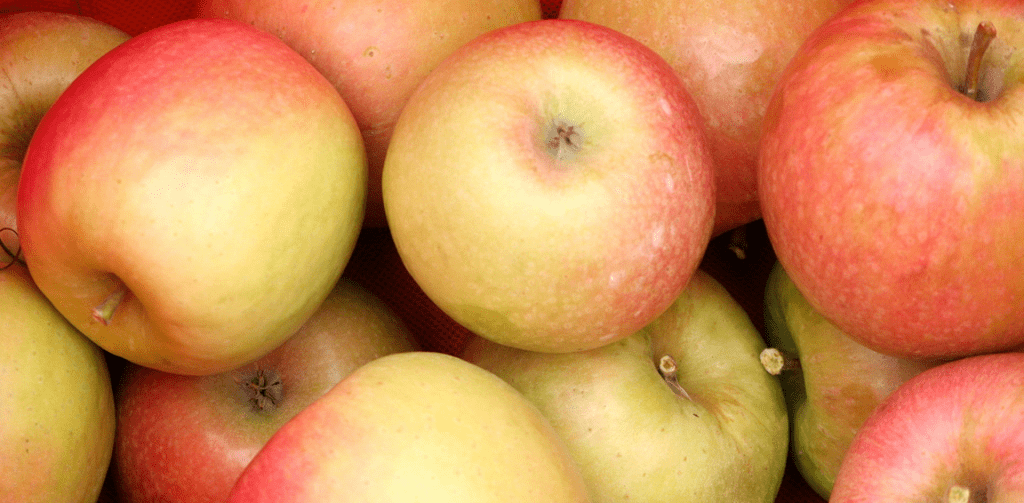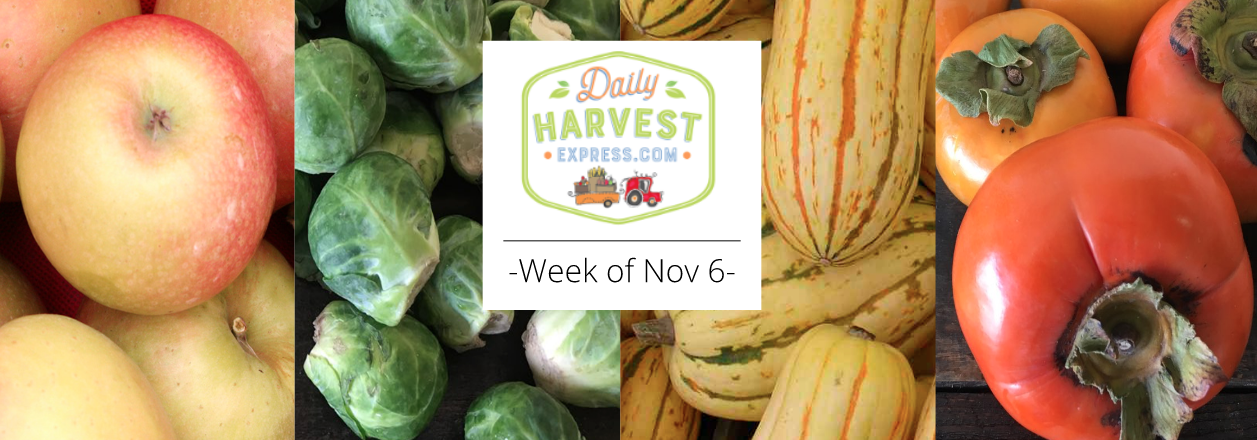We’ve got some great local foods available for you in next week’s box! Since we’d like you to “know your food,” we’re going to highlight a few of the interesting goodies available to you if you place your order before Sun Nov 5th at 5pm:
1. Pink Lady Apples from Sweet Tree Farm

This is perhaps the perfect apple! Its flavor and texture make it ideal for any use: fresh eating, pies and other baking, sauce (raw or cooked), and juice. Our recommendation? Give them a quick cleaning under the faucet, then eat the first one raw, skin and all (the skin contains high concentrations of vitamins and dietary fiber). You might then decide that they’re so dang good eaten fresh that there’s no reason to explore other preparation options. However, if fall has you in the mood for homemade apple pie, here’s a whole wheat and no sugar added apple pie recipe for you to try.
2. Brussels Sprouts from Gaytan Family Farm

Where did this odd looking brassica come from? As the name implies, probably Brussels. The earliest known written description of Brussels sprouts was in 1587 by the Flemish physician and botanist, Rembertus Dodonaeus. Brussels sprouts were brought to America in the 18th century by French settlers. Today, most commercial Brussels sprouts in the US are grown right here in the mild, coastal regions of California since our temperatures are ideal for maximum “sprout” production.
Properly cooked, Brussels sprouts are rich, nutty, and delicious (here are 16 fabulous recipes). The most common cooking mistakes with Brussels sprouts are over-cooking (which makes them bitter and mushy) and boiling (which leaches away vital nutrients into the water and reduces the flavor). Brussels sprouts are loaded with dietary fiber and nutrition–especially vitamins C, K, and B. They also contain what may be the most potent anti-cancer compound on earth: sulforaphane. Although the highest concentrations of sulforaphane are found in broccoli sprouts (as in broccoli microgreens), Brussels sprouts are a great way to eat your dinner and your preventative medicine at the same time!
3. Delicata Squash from Sage Mountain Farm

Want to go truly native while enjoying one of the oldest cultivated plants on earth? Get squash, or “askutasquash” as the native Narragansett tribe called it (European settlers shortened the word a bit). How old are squash? Well, they’re probably the first cultivated plant in the Americas (just ahead of beans and corn). In fact, archaeologists have found domesticated squash seeds in the Guilá Naquitz cave in Oaxaca, Mexico that date back 10,000 years!
Every type of squash is a little different. You don’t want to prepare summer squash like you’d prepare a winter squash such as Butternut. Butternut is sweet, nutty, creamy, and delicious. Our favorite way to prepare them is stupid simple. Cut them into chunks (skin and all), lightly season, and roast in the oven. Here’s the recipe. (Butternut will be available in the U-Pick, but I just learned that the Delicata is going in the farm boxes)
4. Persimmons from Sweet Tree Farm

Asian persimmons were domesticated over thousands of years, which is why they produce a much larger fruit than their native American persimmon cousins that grow wild throughout the southeasters US. They’re quite high in a number of vitamins, most notably Vitamins A and C. As with the Pink Lady apple, we recommend enjoying at least one persimmon fresh. Note its creamy texture and rich, delicious sweetness. If you’re absolutely determined to cook your persimmons, persimmon pudding is to die for!
Order Now!
Get your Daily Harvest Express order placed pronto, no later than Sunday evening at 5pm so you can enjoy another round of fresh, healthy food from local farmers!
Order Now
Want to get more articles like this?
Subscribe to our weekly newsletter to get more local food & farming news from Daily Harvest Express!

